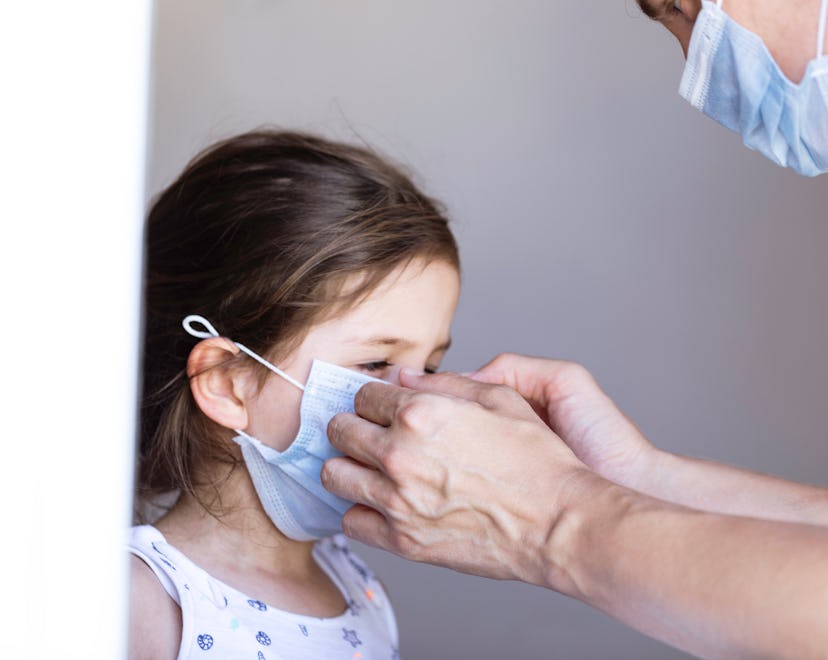Covid-19

Why Are Vaccines For Little Kids Taking So Long?
Boosters are available and there’s full FDA approval for people over 16. When will younger kids get their (literal) shot?
When Covid-19 vaccines were first distributed in early 2021, there was a palpable sense of hope in the air: It was here, we could all relax now. We could hug grandparents and take our masks off in grocery stores and send our kids back to school for a normal year. Until we couldn’t. (OK, I still fully believe you should hug your grandparents if you’re vaccinated, but maybe keep a mask on in the grocery store for a bit longer.)
The Delta variant really messed things up — and has changed the conversation around kids and risk. A year ago, experts were telling us are kids were probably fine but that they needed to stay home to protect the most vulnerable, like elderly relatives. Once adults were vaccinated, many of us believed that kids under the age of 12 could resume some normal operations for a bit, even though they weren’t yet vaccinated themselves.
But because the Delta variant is so highly contagious, it is sweeping through kids much faster than the original Covid-19 variant. The American Academy of Pediatrics reported that in just the last two weeks, Covid cases in children are up 7%, with children representing 14.6% of all Covid-19 cases in the last week.
The overall risks to kids of serious illness and hospitalization are still extremely low, but we’re yet again starting a school year amid discussions of whether school is even a safe place for children and the Biden administration has announced that a third booster shot is recommended for adults who received their shots eight months or more ago.
It’s all enough to make parents wonder: Where the heck are the kid vaccines?
The Safety Bar Is Very High For Approving Any Medication For Young Children
On August 23, the FDA hit a major milestone when it gave full approval to the Pfizer Covid-19 vaccine for people ages 16 and older. (It previously had Emergency Use Authorization.) Dr. Vivek Cherian, an internal medicine physician affiliated with the University of Maryland Health System, believes this is a very good sign that the emergency use authorization — which is now available for Pfizer’s vaccine for children ages 12 to 15 — is going to happen for younger kids as well.
But when?
Pfizer, for example, has maintained that it will submit its request for Emergency Use Authorization for younger children at the end of September, but questions remain about whether that will happen. In July, both Pfizer and Moderna expanded their trials to include more children ages 5 to 11. That could be a sign that the FDA needed more safety data, as the two ways to increase the bar of safety with the vaccine are to prolong monitoring — “which would increase children’s risk of contracting Covid while we await vaccine approval,” says Dr. Kelly Fradin, a private practice pediatrician in NYC — or to increase the number of children in the trial.
“Everyone — parents and pediatricians — have an extremely high bar for determining what is safe for children,” Dr. Fradin tells Romper. “No one wants children to take excessive risk with a vaccine, particularly when children are at lower risk of severe Covid than adults.”
The request for more participants was not, Dr. Fradin believes, a sign that the vaccine was not effective in the younger cohort or that not enough kids were infected with Covid-19 to demonstrate its efficacy, which some people had speculated. “As the mother of a 7-year-old, I'm anxiously awaiting the approval, and I have every reason to think the vaccine will be safe and effective based on what we have seen in children 12 and up,” she says.
What the FDA is most likely looking for is a sign that antibodies are being produced in adequate numbers after the second dose of the vaccine — not whether vaccinated subjects can contract Covid-19. “I do not think we are awaiting children contracting Covid-19 as a primary endpoint of the vaccine trials. The study will look at both symptomatic and asymptomatic infections as secondary outcomes, but the primary outcome specified in the paperwork is antibody titers a month after the second dose of the vaccine. We know from looking at adults and teens that antibody titers are good proxies for immunogenicity, meaning that they demonstrate the vaccine is working in a way that will prevent infections,” says Dr. Fradin.
Younger Children May Also Need A Lower Dose Of Vaccine
Experts also believe that the prolonged studies may result in a lower dose for children. Because younger children have shown a stronger immune response, kids ages 5 to 12 may only need 1/3 of the dose that those over the age of 12 have received, Dr. Bob Frenck, director of the Vaccine Research Center at Cincinnati Children's Hospital, told CNN. Children younger than 5 may need even less.
NBC News also reported that an FDA official said the FDA needs four to six months of follow-up data for kids under the age of 12, but just two months of data was necessary for the adult clinical trials.
And once the vaccine does finally come, all of this extra work, time, and study should help parents feel even more confident that the vaccines are safe and effective. “I am hopeful that this will be a pivotal moment for our country when the FDA officially approves the vaccines for children under the age of 12,” says Dr. Cherian. “It will bring about a broad relief for many parents and schools out there who, up to this point, have had to rely primarily on masking and surrounding kids with fully vaccinated adults.”
Experts:
Kelly Fradin, MD, FAAP
Vivek Cherian, MD, internal medicine physician affiliated with the University of Maryland Health System